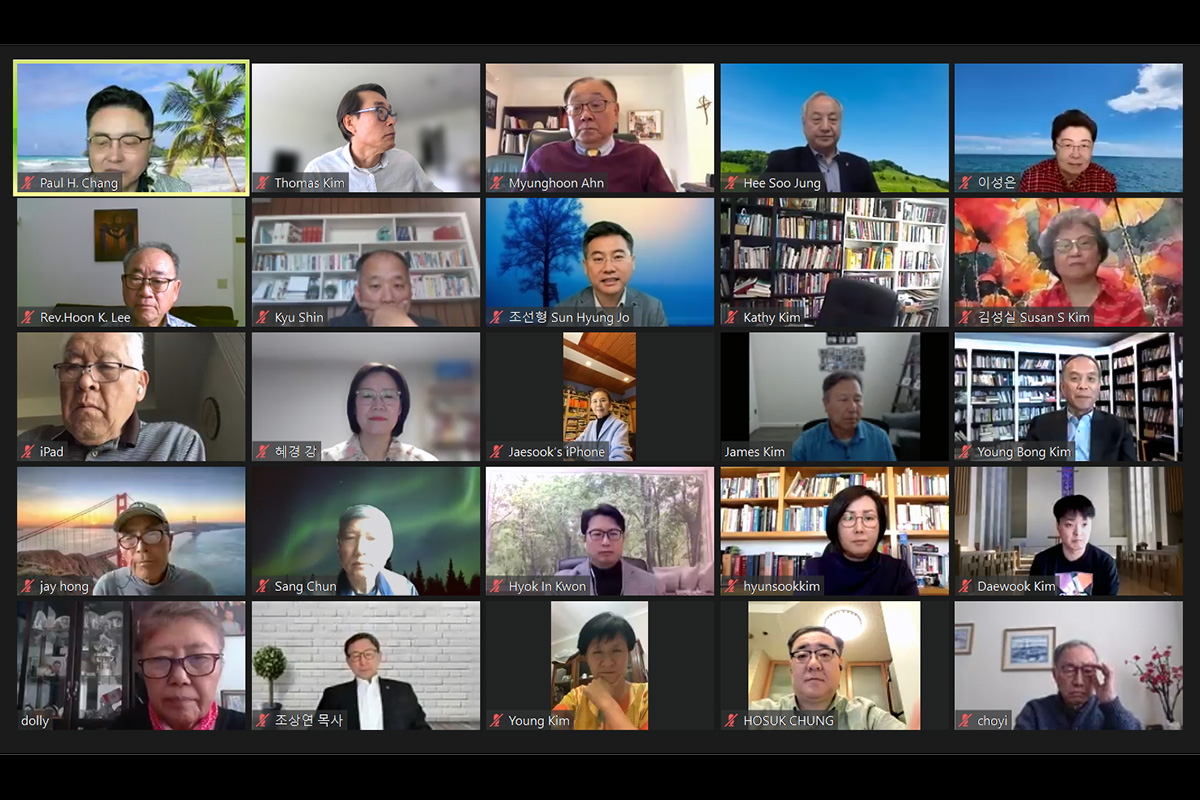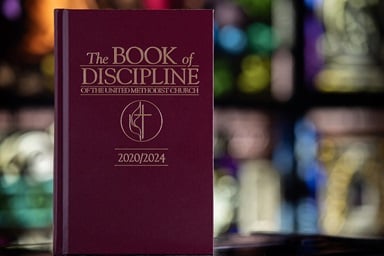Key points:
- A webinar held by the Korean Ministry Plan drew more than 200 participants to discuss the future of the church.
- The Rev. Paul Chang said that disaffiliations are driven by a variety of factors and predicted that 40 of the denomination’s 280 Korean churches would leave.
- The United Methodist Church has nurtured Korean congregations for decades and Bishop Hee-Soo Jung said he sees no justification for leaving.
- Participants also discussed concerns about inclusiveness for women and young people and the possibility of forming a Korean annual conference.
Korean United Methodist leaders sounded notes of hope and commitment to The United Methodist Church during a meeting on the future of the denomination.
More than 200 people attended an April 10 webinar titled “UMC Korean Church Future Conference,” hosted by the denomination’s Korean Ministry Plan. The webinar focused on preparing for new ministries and developing strategies for strengthening congregations, at a time when the denomination is undergoing divisions around theological issues, particularly related to human sexuality.
“Confusion and scars are repeated within the church. … I am grateful for the power of the Holy Spirit working in the midst of chaos and looking forward to hope and miracles,” said Bishop Hee-Soo Jung of the Wisconsin Conference. “I see no justification for leaving The United Methodist Church, which has loved and nurtured the Korean churches for the past 50 to 60 years.”
The United Methodist Church is the second-largest Protestant denomination in the United States, with 6.4 million members, and 13 million members worldwide. The 2020 General Conference, the denomination’s top legislative assembly, was expected to resolve the church’s long-standing debate over the inclusion of LGBTQ people by providing a way for congregations to leave based on theological differences. When the assembly was postponed because of the pandemic, the Wesleyan Covenant Association and other traditionalist groups within the denomination launched the Global Methodist Church in May 2022.
In 2019, a special General Conference created a temporary law allowing churches in the United States to leave the denomination with their assets despite the denomination's trust clause. That temporary provision was adopted as Paragraph 2553 in the denomination’s Book of Discipline. According to the Lewis Center, by the end of 2022, 1,967 churches, or about 6.6% of United Methodist churches in the United States, had left the denomination, and a number of Korean churches are expected to leave as well.
“The issue of LGBTQ is only a trigger for the people to leave the denomination,” said the Rev. Paul H. Chang, executive director of the Korean Ministry Plan. The real reasons, he said, are “first, dissatisfaction and conflict around episcopal politics of The United Methodist Church. The second is the expression of dissatisfaction of those who think the apportionment is excessive, and the third is the gap between moderate or progressive leadership and conservative pastors and lay people.”
Subscribe to our
e-newsletter
Chang introduced the findings of a new Lewis Center for Church Leadership report that looks at characteristics of departing and staying churches, based on 2019 statistics. He said that most of the churches are white churches served by male pastors, and they are located in the Southeastern and South Central jurisdictions.
Chang also reported the status and data of Korean clergy.
“Currently, there are 280 Korean churches — 244 Korean-speaking congregations and 36 English-speaking congregations,” he said. “Two hundred and seventy pastors serve Korean churches, 550 pastors serve under cross-racial/cultural appointments in addition to one bishop, 19 superintendents and 30 pastors (that) serve beyond local churches, such as boards and agencies or schools,” he added. “And about 50 Korean pastors will be ordained during this year’s annual conferences, which means that the number of Korean pastors will likely exceed 900.”
He predicted that about 40 Korean churches, or 14% of the 280 Korean churches, would leave the denomination.
The 40 churches belong to the Association of Korean Churches in The United Methodist Church, a conservative group that has been working with the Wesleyan Covenant Association. The association is different from the larger Association of Korean United Methodists, which comprises all of the Korean congregations in the denomination.
As Bishop Jung voiced hope for the future, he also shared pastoral guidance.
“Stop interpreting the Bible literally, exclusively and violently, and let us practice hospitality and holiness through integrated reflection,” Jung said. “Confess to be a godly community overcoming the white supremacy and colonialism, and be an honest and humble seeker.”
The Rev. Young Bong Kim of Washington Korean United Methodist Church of Koinonia interpreted the current situation through the early church in Acts 15.
“The first challenge of the early church was the circumcision of Gentiles,” Kim said. “At that time, James, the leader of the church, was torn between his beliefs and the situation. We have to learn that James tried to honor and respect our differences and diversity, and persuaded both Antioch and Jerusalem.
“In any system, good and evil are mixed. If evil is overwhelming, you should separate, but if not, you should live with each other. Organizations with only one voice are terrible,” Kim said. “I hope I can see the leaders of The United Methodist Church following the way of the cross instead of spear and sword in the process of splitting the denomination.”
Four lecturers addressed the gathering, followed by brief remarks from each person in a panel setting.
The Rev. Hyok In Kwon of the Korean United Methodist Church of Santa Clara Valley in San Jose, California, told why he has decided to remain in The United Methodist Church.
“I was not a Methodist in Korea. However, I chose The United Methodist Church as my church after I studied the church’s doctrines, and found the church’s wonderful work in various areas and fields, and striving to overcome racial barriers.”
Pastor Kwon also shared his hope for the Korean church.
“I hope it will be not just a church for immigrants, but a church that can explain why it exists and how it will serve the area where the church exists.”
The Rev. Koh Eun-young, who serves at Tucson First United Methodist Church, which consists of Korean and English congregations, said that she feels brokenhearted that the younger generation is leaving the church due to the authoritarianism of Korean churches.
“There are theological points of view that no community can agree on,” said the Rev. Sun Hyung Jo of Chicago Jesus Love Korean United Methodist Church. “Don’t live according to the letters of the Bible, but live according to the spirit of the Bible. There are times when the letter and the spirit of the Bible coincide, but as time goes by, there are times when the spirit and the content collide, and then I think we should follow the spirit.
“I hope that the Korean church will become a church that is like a home, not a church that is like a house. I want it to be a church where everyone feels at home, coming into the arms of Jesus in hospitality,” he added.
The Rev. Pauline H. Kang spoke from the perspective of a Korean woman pastor who grew up in Korea and is serving a U.S. congregation in a cross-racial/cultural appointment.
“In February of this year, the Southern Baptist Convention expelled Saddleback Church for ordaining three women,” she said. “It is sad to see churches discriminating in the name of keeping the authority of the Bible. I understand the fear of not experiencing a female pastor in Korean churches. However, I hope they will try to experience a female pastor with greater inclusiveness.”
The Rev. Timothy Ahn is the senior pastor of Arcola Korean United Methodist Church in Paramus, N.J., and mission district superintendent of the Korean Mission of the Northeastern Jurisdiction.
“We should seek unity among diversity, respect the Bible, and at the same time believe in the guidance of God, who speaks through circumstances,” Ahn said.
He drew the most attention during the webinar when he cautiously projected the possibility of creating a Korean annual conference, even though there is no language for an annual conference based on any ethnic/racial conference because of the pain around the segregated Central Jurisdiction experience in the history of the Methodist Church in the United States.
“The Korean Mission of the Northeastern Jurisdiction would be a safe zone to protect the traditional faith of Korean pastors and churches in the jurisdiction,” Ahn said. “I hope that Korean Mission can be organized in other jurisdictions, and furthermore, (a) Korean annual conference can be organized for Korean churches in God's way.”
Kim is director of Korean and Asian news at United Methodist Communications. Contact him at 615-742-5470 or [email protected]. To read more United Methodist news, subscribe to the free Daily or Weekly Digests.




